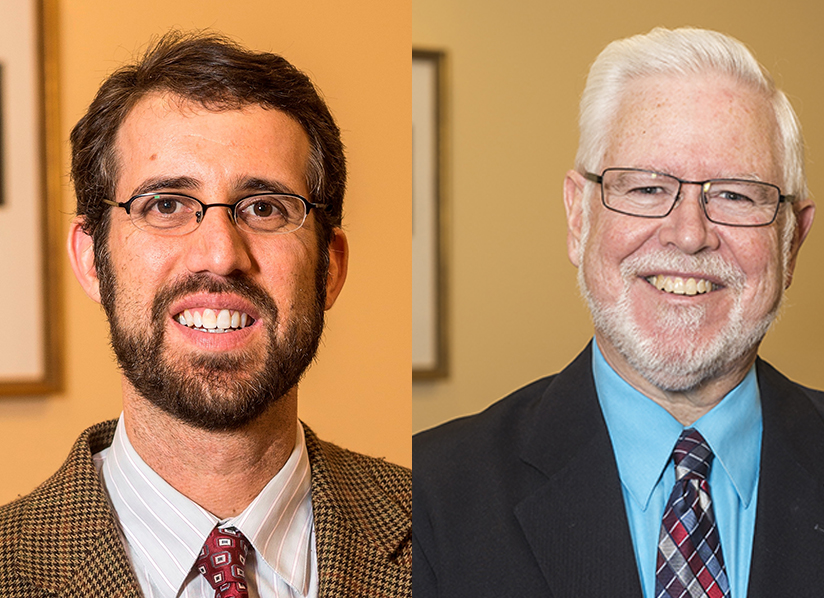Holocaust Remembrance Day is a call to “refuse to turn our eyes away from (the) terrors” of genocide, said scholars from the Institute of Jewish-Catholic Relations (IJCR) at Saint Joseph’s University.
Founded in 1967, the IJCR is the oldest university center of its kind in the U.S. created in response to the Second Vatican Council’s call for increased interfaith dialogue.
The institute’s directors, professors Philip Cunningham and Adam Gregerman, recently reflected on the annual commemoration, which fell this year on April 8.
[hotblock]
Also known as Yom Hashoah, the observance corresponds to the dates of the Warsaw Ghetto Uprising, an April-May 1943 armed resistance by Jews to the Nazi regime.
Ghettos, segregated sectors within the Polish capital and in several other Nazi-occupied cities, were created as part of a systematic program to annihilate the European Jewish population, six million of whom were ultimately slaughtered in the Shoah, the preferred Hebrew term for the Holocaust.
In the Warsaw ghetto alone, some 300,000 Jews were murdered or deported to extermination or forced labor camps. Prior to the armed resistance, another 83,000 had already died of starvation and disease. Seven thousand were killed in the uprising itself, while an additional 7,000 were deported to the Treblinka killing center, where most were gassed upon arrival.
Yet such atrocities, which represented just a fraction of the Shoah’s human suffering, are in danger of being forgotten, said Gregerman, making the April 8 memorial (and its U.N.-sponsored International Holocaust Remembrance Day in January) more vital than ever.

Professors Adam Gregerman (left) and Philip Cunningham of the Institute for Jewish-Catholic Relations at Saint Joseph’s University said that the lessons of the Shoah must not be forgotten, and that increased vigilance is required to counter rising discrimination and hatred. (CatholicPhilly.com composite photo/Saint Joseph’s University)
“As the number of survivors dwindle, there is all the more a responsibility on those of us in later generations to not only keep their memory alive and tell their stories, but to draw the appropriate lessons from the terrible experience,” he said.
Those lessons include “making others aware of the horrors that hatred of Jews could lead to,” and those sparked by “racial and religious hatred” in general, said Gregerman.
Cunningham admitted the Shoah prompted “two somewhat contradictory reactions” in him.
“Faced with the enormity of the evils that occurred under the Nazi regime, one is at a loss for words,” he said.
Pope Francis expressed a similar sentiment during his July 2016 visit to the Auschwitz-Birkenau killing center, part of the larger Auschwitz complex where approximately 1.1 million were murdered, many through gassing with Zyklon B, a rat and insect poison. Medical experimentation and forced sterilizations were also practiced at the complex.
The camp was also the one in which Franciscan priest St. Maximilian Kolbe was executed by a lethal injection of carbolic acid (following a prolonged period of starvation) in August 1941, offering his life to spare that of a fellow prisoner.
[hotblock2]
Prior to his silent walk through the grounds, the pope resolved not to deliver an address, preferring instead to “go to that place of horror without speeches, without crowds. … Alone, enter, pray. And may the Lord give me the grace to cry.”
At the same time, said Cunningham, remaining mute amid current and escalating trends of discrimination is not an option.
“Silence is an inadequate response to the growth of white supremacism in our nation, and the mounting number of physical assaults on minorities of any kind, including the murders of 11 Jews” at the Pittsburgh-based Tree of Life synagogue in October 2018.
Cunningham said Pope Francis “wisely observed that ‘the Shoah teaches us that utmost vigilance is always needed to be able to take prompt action in defense of human dignity and peace.’”
Gregerman added that “in the face of such hatred, it is appropriate to look for signs of hope, and for indications of ways hatred can be overcome.”
He pointed to advances in “post-Shoah Jewish-Christian relations” as one such example can help “encourage others to seek change and to speak out.”
PREVIOUS: Philly parish hosts high-tech bingo to benefit school
NEXT: Archdiocesan program shows troubled teens ‘A Better Way’




Share this story